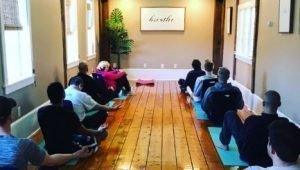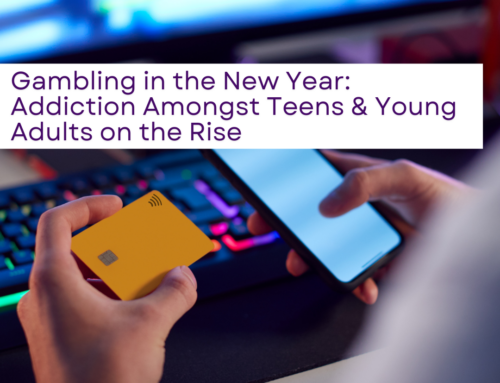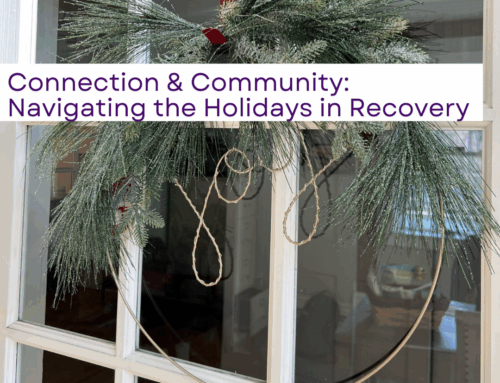Summer is a time of more relaxation and down time than most of us have during the rest of the year, but as we prepare for the fall and a return to more structured routine, it’s good to revisit the healthy coping mechanisms we use to manage stress.
Stress is an inevitable part of life, but fortunately there are many tools we can use in recovery to handle both the unexpected and expected stressors that come our way. Feeling overwhelmed can be a common feeling for people in recovery, and cultivating a structured routine that prioritizes wellness and self-care goes a long way towards giving us the energy and outlook we need to manage the more difficult times.

Healthy Diet and Hydration
A diet rich in healthy, nutrient-rich foods fuels not just our body, but our mind. Snacks and meals that are balanced with whole grains, vegetables, fruits, healthy carbohydrates, and protein are key. Drinking water and non-diuretic fluids throughout the day is also essential. Diets that are higher in sugar, sodium, caffeine, and unhealthy carbohydrates create “crashes” that can increase stress and inhibit recovery by causing sleep problems, low energy. and headaches. A good time to think about healthy eating is when you do your shopping! Keeping your cupboards stocked with healthy foods decreases the chances you’ll reach for something less healthy. It’s easier to walk away from the chips in the grocery store aisle than it is to resist them as a late-night snack!
It’s also important to have structure and routine around your eating habits, as becoming overly hungry or dehydrated has a direct impact on mood, and can lead to more impulsive (and not always healthy) decisions. When you’re on the go, carry healthy snack alternatives to ensure you don’t go long periods of time without eating, even if there isn’t time for a sit-down meal. Nuts, dried fruits, yogurt packs, cubed cheese, and hard-boiled eggs are healthy alternatives. Carry a bottle of water with you as well; if you aren’t a fan of plain water add a slice of fruit or other healthy flavoring to increase the odds you will drink throughout the day.

Sleep
Getting enough sleep is essential to maintain a healthy recovery and reduce stress. When we are sleep-deprived it impacts our physical, mental, and emotional health. Create a relaxing evening routine, reduce your caffeine intake later in the day, and step away from the screen before bedtime to give yourself the best chance of a good night’s sleep. If you find you are staying up late and taking naps during the day, this can alter your natural sleep cycle. Resist the afternoon nap and go to bed at a reasonable hour to train your body to want to sleep at night.
Find bedtime rituals that don’t revolve around screen time. A good book, meditation practice, or hot bath take your body’s energy levels down. Turn off your phone notifications so you aren’t distracted by beeps and pings as you’re trying to fall asleep. Herbal teas such as chamomille naturally induce sleep and are a healthy alternative to sleep medications.
Exercise
Exercise is a powerful stress buster and mood booster. Make sure that you move your body in a way that feels good to you; this increases the chances that you’ll stick to your fitness regime. Even moving your body for only 20 minutes a day can have a big impact. Exercise releases endorphins that make you feel good, and can help to give your mind a break. Exercise also helps you to sleep better which in turn helps with stress management.
Exercise can also provide structure and routine to your day. Starting the day with a calming walk for 20 minutes or so puts you in a positive mindset and gives predictability to your mornings. The same holds true for the end of the day; taking a walk before you launch into your evening responsibilities is a natural and healthy way to reset, particularly at the end of a stressful day.
Mindfulness and Letting Go
One of the ways we can create unnecessary stress in our lives is by trying to control the uncontrollable. It’s unavoidable to have external pressures and responsibilities, but recovery needs us to let go of things that no longer work in our lives and develop the ability to let go of our desire to control external people, places, or things. Realizing your own behavior is the only thing you can take control of is hugely beneficial in managing stress. You can never control what is happening on the outside, but you CAN control how you deal with it, and make choices that help you move forward.

A mindfulness practice helps with letting go. There are simple and quick mindfulness tools you can use, even in the midst of a busy day. Taking a minute to stretch, or focus on your breathing, can reduce racing thoughts and give you a little reset. A quick mindfulness meditation also helps. For one minute, repeat ‘May I be happy, may I be well, may I be filled with kindness and peace.’ You can substitute “you” for “I” and think of someone you know and like, or just send love to all people.
Herren Wellness’ Approach to Wellness
We understand that recovery – from anything – is a difficult time full of a range of emotions. We work with guests to create a whole-health action management plan, allowing them to discover and explore many opportunities in recovery.
We help foster healthy habits and routines, including nutrition, fitness, sleep hygiene, creative exercises, and group activities that allow guests to reconnect with the things they love or discover new interests. We help guests build the skills that are essential to a sustainable recovery, including mindfulness practices, self-care and self-esteem skills, maintaining healthy relationships, and digging into the root causes of what led them to become dependent.

We guide guests on how to build upon the skills they already possess and help them discover their ‘why’, or what motivates them to maintain a life of wellness and recovery.
We also work with guests to create a meaningful and sustainable aftercare plan that includes healthy habits and routines that are meaningful to them. When you come to Herren Wellness, you become part of a vibrant and thriving community that doesn’t end when your stay ends. You become part of the Herren Wellness family.
If you, or a loved one, is looking for help, please call us at (844) 443-7736, email us at info@herrenwellness.com, or fill out a contact form. You are not alone.





